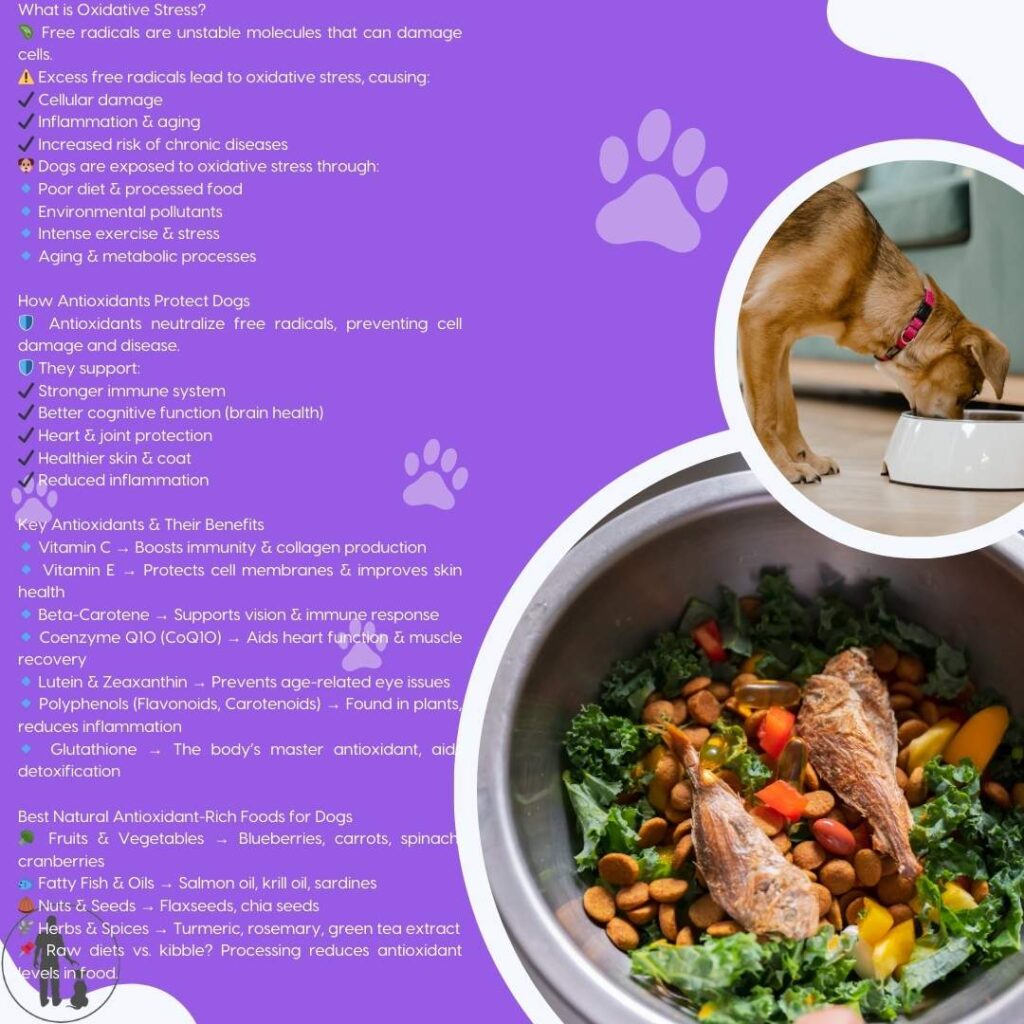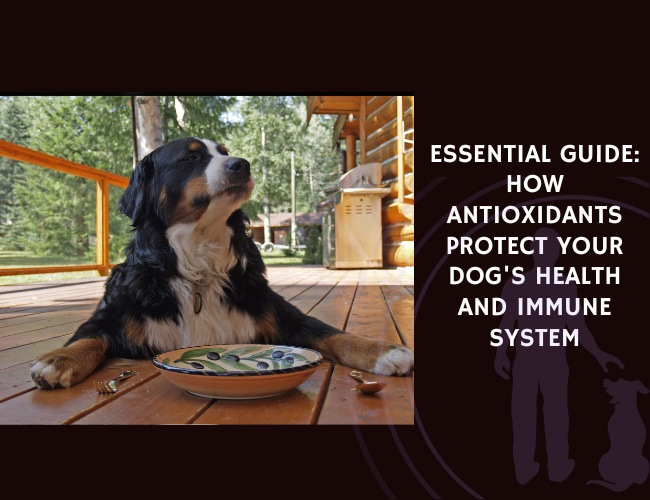Understanding Oxidative Stress in Dogs
What is Oxidative Stress?
Oxidative stress occurs when there is an imbalance between free radicals and antioxidants in the body. Free radicals, also known as reactive oxygen species (ROS), are unstable molecules that can cause significant damage to cells, proteins, and DNA. In dogs, this imbalance can lead to various health issues, highlighting the importance of maintaining balance through nutrition and lifestyle choices.
Impact of Oxidative Stress on Canine Health
Oxidative stress can have several detrimental effects on a dog’s health, contributing to:
- Cell Damage: Free radicals can damage the structure of cellular components, leading to dysfunction and cell death. This is particularly concerning in rapidly dividing cells, such as those in the gut or skin.
- Inflammation: When cells are damaged by free radicals, they can release pro-inflammatory molecules. This inflammation can worsen conditions like arthritis and allergies.
- Aging: Persistent oxidative stress is linked to the aging process and age-related diseases, including cognitive decline and certain cancers.
How Free Radicals Cause Cellular Damage and Inflammation
Free radicals are highly reactive due to unpaired electrons, making them unstable. They seek stability by reacting with nearby molecules, a process that can result in oxidative damage. Here are key ways in which free radicals cause harm:
- DNA Damage: Free radicals can break DNA strands or modify DNA bases, potentially leading to mutations and cancer.
- Protein Oxidation: They can cause changes in protein structure, impairing enzyme functions and signaling pathways.
- Lipid Peroxidation: Free radicals react with lipids in cell membranes, leading to loss of membrane integrity and cell lysis.
When oxidative damage accumulates, it can elicit an immune response, triggering chronic inflammation. This inflammation can become a persistent cycle, further exacerbating oxidative stress.
Common Factors that Increase Oxidative Stress in Dogs
Several factors can exacerbate oxidative stress in dogs:
- Poor Diet: Diets lacking in essential antioxidants fail to combat free radical damage, increasing oxidative stress. Ensuring a nutrient-rich diet with ample antioxidants is essential.
- Environmental Pollutants: Toxins and pollutants in the environment can increase free radical production. Dogs exposed to higher levels of such pollutants are at greater risk of oxidative stress.
- Stress: Both psychological and physical stress can heighten oxidative stress. Situations causing anxiety or prolonged physical exertion contribute to an increased risk of cellular damage.
- Excessive Exercise: While moderate exercise is beneficial, excessive exercise can lead to an upsurge in free radical production and oxidative stress.
Maintaining a balanced lifestyle, providing a nutrient-rich diet, and protecting your dog from unnecessary stress and environmental pollutants can help mitigate the damaging effects of oxidative stress.
By understanding the underlying mechanisms and factors contributing to oxidative stress, pet owners can take proactive measures to support their dogs’ health and longevity.
The Power of Antioxidants in Canine Health
As we’ve learned in the previous chapter, oxidative stress can significantly impact your dog’s health. Now, it’s time to dive into how antioxidants can help! 🐶✨
How Antioxidants Work to Neutralize Harmful Free Radicals
Antioxidants are nature’s counterbalance to oxidative stress. These beneficial compounds work by donating electrons to free radicals, which are unstable molecules with unpaired electrons. Free radicals seek out electrons from other molecules, causing a chain reaction of damage. Antioxidants intervene by giving their own electrons to these free radicals, effectively neutralizing them and stopping the chain reaction of harm.
Think of antioxidants as peacekeepers in your dog’s body. They maintain order and prevent the chaos that free radicals cause when they go unchecked. This neutralization is critical in maintaining cellular integrity and function, helping your furry friend stay happy and healthy.
Supporting Immune Function with Antioxidants
A healthy immune system is crucial for your dog’s well-being, and antioxidants play a starring role in supporting immune function. Antioxidants boost the immune response by protecting immune cells from oxidative damage, ensuring they function optimally.
For instance, vitamins C and E are powerful antioxidants that enhance the body’s defense mechanisms. They help maintain the health of white blood cells, which are essential for fighting off infections. Reliable immunity is the first line of defense against numerous diseases, and antioxidants are key players in keeping this defense strong and ready.
Connection Between Antioxidants and Inflammation Reduction
Inflammation is the body’s natural response to injury and infection. However, chronic inflammation can lead to various health problems, including arthritis and allergies. Oxidative stress is a known contributor to chronic inflammation, and this is where antioxidants step in.
By neutralizing free radicals, antioxidants help reduce inflammation and its associated symptoms. For example, beta-carotene, a type of antioxidant, has been shown to mitigate inflammatory responses. By lowering excessive inflammation, antioxidants can alleviate pain and improve mobility in dogs, particularly those suffering from inflammatory conditions like arthritis.
Furthermore, antioxidants can reduce the risk of chronic diseases. The link between chronic inflammation and conditions such as cancer and heart disease is well-documented. By keeping inflammation in check, antioxidants provide a protective shield against these serious health issues.
To summarize, antioxidants are an invaluable addition to your dog’s health regimen. From neutralizing harmful free radicals to supporting immune function and reducing inflammation, these compounds are essential in promoting overall well-being.
Transitioning to the next aspect of caring for your dog’s health, we’ll explore the best sources of these vital antioxidants and how they can be incorporated into your furry friend’s diet.
Essential Antioxidants for Dogs
As we dive deeper into the health of our furry friends, let’s explore some key antioxidants that play an integral role in maintaining their overall well-being. Understanding these essential nutrients will enable you to make informed decisions about your dog’s diet and supplements.
Key Antioxidants: Vitamins C, E, and Beta-Carotene
Certain antioxidants are crucial for canine health, and three of the most significant are vitamins C, E, and beta-carotene.
Vitamin C
Vitamin C, also known as ascorbic acid, is a powerful antioxidant. It helps neutralize free radicals, reducing oxidative stress and preventing cellular damage. Besides its antioxidant properties, vitamin C supports collagen production, which is vital for healthy skin, joints, and connective tissues. Although dogs can synthesize vitamin C naturally, additional supplementation can be beneficial, especially in times of stress or illness.
Vitamin E
Vitamin E acts as a protector of cell membranes. It prevents the oxidation of fats and other molecules, which is essential for preventing cellular damage. By maintaining the integrity of cell membranes, vitamin E supports overall cellular function and skin health. Additionally, it strengthens the immune system by enhancing the body’s natural defense mechanisms against infections and diseases.
Beta-Carotene
Beta-carotene, a precursor to vitamin A, is another significant antioxidant. It’s particularly beneficial for eye health and immune response. Beta-carotene helps maintain and improve vision, especially in low-light conditions. It also enhances the immune system by boosting the production and function of white blood cells, fortifying the body’s defense against pathogens.
The Importance of Coenzyme Q10 and Glutathione
Beyond the commonly known vitamins, two other antioxidants play vital roles in canine health: coenzyme Q10 (CoQ10) and glutathione.
Coenzyme Q10 (CoQ10)
CoQ10 is essential for maintaining heart health and promoting optimal mitochondrial function. As a critical component of the cell’s energy production process, CoQ10 assists in generating adenosine triphosphate (ATP), the primary energy currency in cells. This is crucial for heart health, as the heart requires a continuous supply of energy to function correctly. CoQ10 also helps reduce oxidative damage in the body, supporting overall vitality and longevity.
Glutathione
Often referred to as the “master antioxidant,” glutathione is pivotal in detoxification. It exists in high concentrations within cells and works directly to neutralize free radicals and reactivate other antioxidants. Glutathione is especially vital for liver health, where it helps in detoxifying harmful substances, ensuring your dog’s liver remains healthy and functional. Adequate levels of glutathione are essential for a robust immune system and overall health.
Key Takeaways
Antioxidants like vitamins C, E, beta-carotene, CoQ10, and glutathione are indispensable allies in combating oxidative stress and promoting your dog’s well-being. Each plays a unique role, from supporting cellular integrity and immune function to protecting vital organs and systems. A well-balanced diet enriched with these antioxidants can pave the way for a healthier, happier furry companion.
Up next, we’ll explore natural sources of these powerful antioxidants and how you can incorporate them into your dog’s diet to maximize their health benefits.

Natural Sources of Antioxidants
When it comes to keeping your furry friend healthy, incorporating natural sources of antioxidants in their diet is key. Antioxidants play a crucial role in neutralizing harmful free radicals, supporting immune function, and reducing inflammation. And the best part? Many natural foods are rich in antioxidants and can be easily added to your dog’s diet. Let’s delve into these beneficial fruits, vegetables, and more.
Beneficial Fruits and Vegetables Rich in Antioxidants
Several fruits and vegetables are packed with powerful antioxidants that can boost your dog’s health. Here are some top picks:
- Blueberries: These tiny berries are a powerhouse of antioxidants, particularly vitamin C and polyphenols, which support immune health and fight oxidative stress.
- Carrots: Rich in beta-carotene, carrots are excellent for vision health and can contribute to a robust immune system.
- Kale: This leafy green vegetable is packed with vitamins A, C, and K, as well as lutein, making it great for reducing inflammation and supporting eye health.
- Spinach: Full of vitamins E and C, spinach helps combat oxidative stress and boosts overall vitality.
- Cranberries: Known for their high antioxidant content, cranberries can help in maintaining urinary tract health.
Healthy Sources Like Fatty Fish, Nuts, and Seeds
Fruits and vegetables aren’t the only natural sources of antioxidants. Certain fish, nuts, and seeds are also rich in these valuable compounds:
- Salmon: Loaded with omega-3 fatty acids and astaxanthin, salmon aids in reducing inflammation and promoting heart health.
- Chia Seeds: These small seeds are a great source of polyphenols and can be easily sprinkled over your dog’s meals for an antioxidant boost.
- Flaxseeds: High in omega-3 fatty acids and lignans (a type of polyphenol), flaxseeds support overall health and reduce inflammation.
- Krill Oil: Another fantastic source of omega-3s and astaxanthin, it promotes joint health and reduces oxidative stress.
- Turmeric: This golden spice contains curcumin, a powerful antioxidant that helps in reducing inflammation and supporting joint health.
Natural Food Sources vs. Processed Dog Food Options
When it comes to choosing between natural food sources and processed dog food, the former often has the upper hand. While processed dog foods might be fortified with synthetic antioxidants, they do not always provide the same benefits as their natural counterparts. Fresh fruits, vegetables, nuts, seeds, and fish contain a complex matrix of nutrients that work synergistically, offering more comprehensive health benefits.
However, incorporating these foods into your dog’s diet requires some thought. Ensure that they are introduced gradually and appropriately, as some ingredients might not be suitable for all dogs. For example, while blueberries and carrots are generally safe, certain seeds and spices should be added cautiously due to potential digestive issues.
Transition to the Next Topic
As you focus on integrating these antioxidant-rich foods into your dog’s diet, it’s essential to consider their specific needs based on their life stage. From puppies to seniors, the types and amounts of antioxidants required vary. Understanding these requirements will help in tailoring a diet that supports their health throughout their life.
Antioxidants for Different Life Stages
Benefits for Senior Dogs
As dogs age, their bodies undergo myriad changes, including the gradual decline of cognitive functions similar to humans. Canine cognitive dysfunction (CCD) is a condition often seen in senior dogs, where symptoms may include disorientation, altered sleep patterns, and changes in interaction with family members. Antioxidants play a crucial role in mitigating these effects.
Antioxidants such as vitamins C and E, beta-carotene, and coenzyme Q10 help combat oxidative stress, which is significantly linked to cognitive decline. By neutralizing free radicals, these antioxidants shield brain cells from damage, potentially slowing the progression of CCD. Additionally, antioxidants can benefit joint health by reducing inflammation and alleviating arthritis symptoms, thereby improving mobility in senior dogs. This comprehensive approach can enhance the quality of life and prolong healthspan in aging dogs.
Supporting Active Dogs and Athletic Performance
Active dogs, whether they are working breeds, agility competitors, or just energetic pets, face increased oxidative stress due to intensive physical exertion. Exercise-induced oxidative stress can lead to cellular damage if not properly managed. Providing antioxidants can be a game changer for these active canines.
Antioxidants help support muscle recovery after strenuous activities. For instance, vitamin C aids in collagen production, vital for muscle repair, while vitamin E protects muscle cells from oxidative damage. Beta-carotene and coenzyme Q10 are also beneficial in maintaining cardiovascular health, which is critical for active dogs. Overall, integrating antioxidants into their diet can enhance athletic performance, ensure quicker recovery, and allow your dog to maintain high energy levels.
Age-Appropriate Antioxidant Supplementation
It is essential to consider the life stage of your dog when introducing antioxidant supplements, ensuring their diet is balanced and tailored to their specific needs.
- Puppies and Young Dogs: These stages require antioxidants to support rapid growth and development. Vitamins such as C and E are crucial, aiding in the development of the immune system.
- Adult Dogs: Dogs in their prime benefit from antioxidants that maintain overall health and mitigate the gradual onset of age-related conditions. A combination of vitamins, polyphenols, and coenzyme Q10 can be particularly beneficial.
- Senior Dogs: Older dogs have higher antioxidant needs to support cognitive health and counteract the effects of aging. Higher doses of vitamins E, C, and beta-carotene, alongside glutathione, can be effective.
Proper dosage of antioxidant supplements is vital. Over-supplementation can lead to toxicity and health issues, so always consult with a veterinarian to determine the appropriate amount based on your dog’s breed, size, and specific health conditions.
By thoughtfully integrating antioxidants into your dog’s diet, you can help them lead a healthier, more vibrant life at any age.
Safety and Supplementation Guidelines
When considering antioxidant supplements for your dog, it’s important to understand the distinctions between natural and synthetic options, determine the correct dosage based on breed and size, and be aware of the risks associated with over-supplementation.
Natural vs. Synthetic Antioxidant Supplements
Concerns with Synthetic Antioxidants:
Synthetic antioxidants, such as butylated hydroxyanisole (BHA), butylated hydroxytoluene (BHT), and ethoxyquin, have raised health concerns. Despite being used to preserve fats in dog food, their long-term effects on canine health are still debated. Potential issues include:
- Toxicity: Synthetic antioxidants can cause adverse reactions and toxicity in some dogs.
- Long-term Health Effects: There are ongoing debates about the impact of synthetic antioxidants on overall health, including potential links to cancer.
Benefits of Natural Antioxidants:
Opting for natural sources of antioxidants can often be more beneficial. Natural antioxidants found in fruits, vegetables, nuts, and seeds are likely to provide a broader range of health benefits without the risks associated with synthetic additives.

Determining Proper Dosage
The appropriate dosage of antioxidant supplements can vary significantly depending on a dog’s breed, size, and specific health conditions. Here are some general guidelines to help tailor the dosage:
- Small Breeds: Small dogs typically require lower doses. For instance, a dosage of 50-100mg of vitamin C per day might suffice.
- Medium Breeds: Medium-sized dogs may need a slightly higher dosage. For example, 100-200mg of vitamin C daily.
- Large Breeds: Larger dogs tend to need the highest doses. They might benefit from 200-500mg of vitamin C each day.
Individual Health Needs: Always consult with a veterinarian to determine the best dosage for your dog’s specific health needs and conditions.
Risks of Over-Supplementation
While antioxidants offer substantial health benefits, over-supplementation can lead to imbalances and toxicity:
- Vitamin E Toxicity: Excessive vitamin E can cause nausea, diarrhea, and bleeding problems.
- Vitamin C Overload: Too much vitamin C can lead to gastrointestinal upset and may contribute to kidney stone formation.
Key Takeaways
Antioxidant supplementation can greatly benefit your dog’s health, but it’s crucial to choose natural sources over synthetic options whenever possible. Tailor the dosage carefully to your dog’s breed, size, and individual health needs, and always be cautious to avoid over-supplementation to prevent potential toxicity. Consulting with a veterinarian is the best way to ensure you’re providing the optimal amount of antioxidants for your dog’s well-being.
Incorporate these guidelines into your dog care routine to help keep your furry friend healthy, vibrant, and thriving at all life stages.










